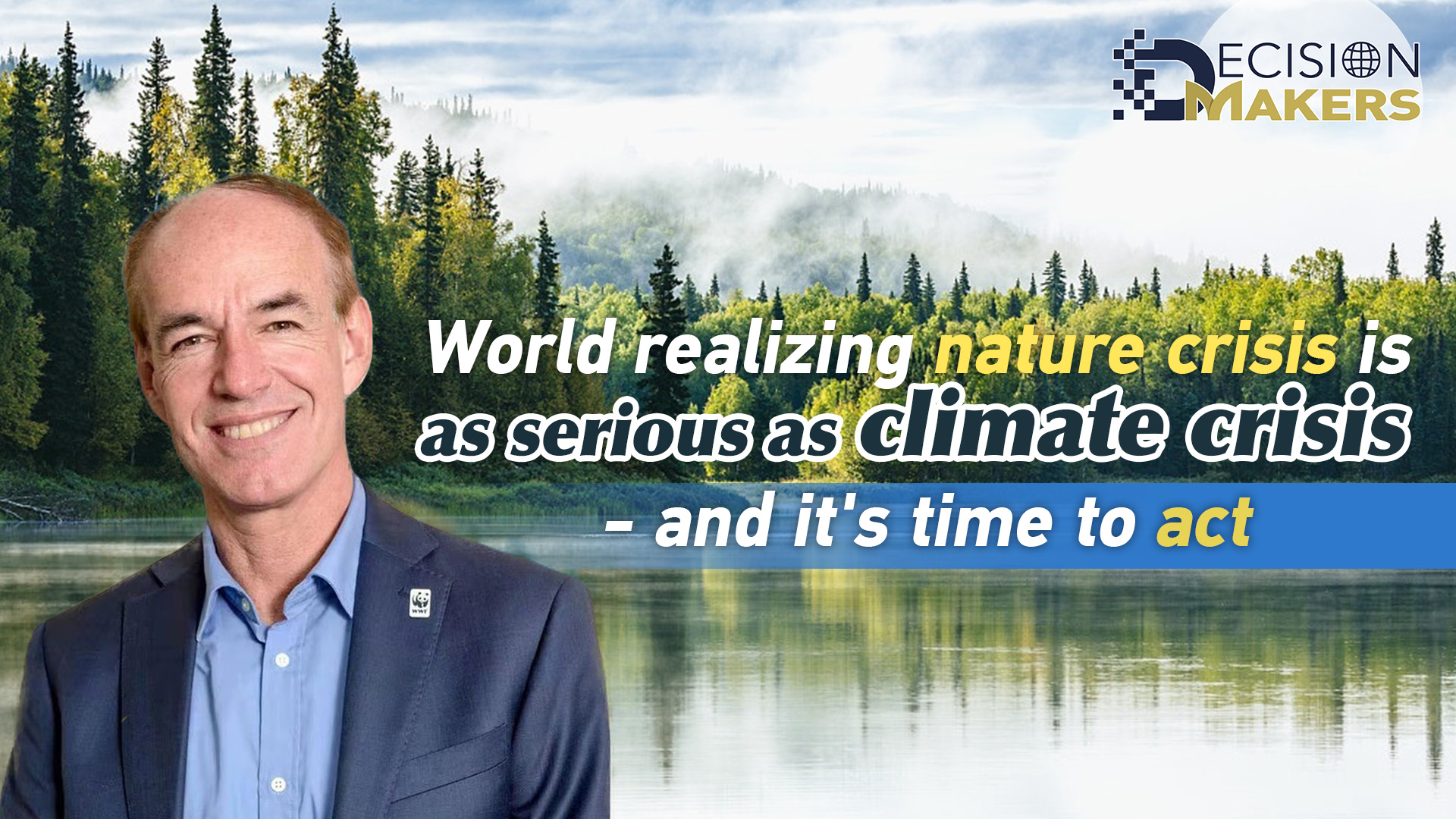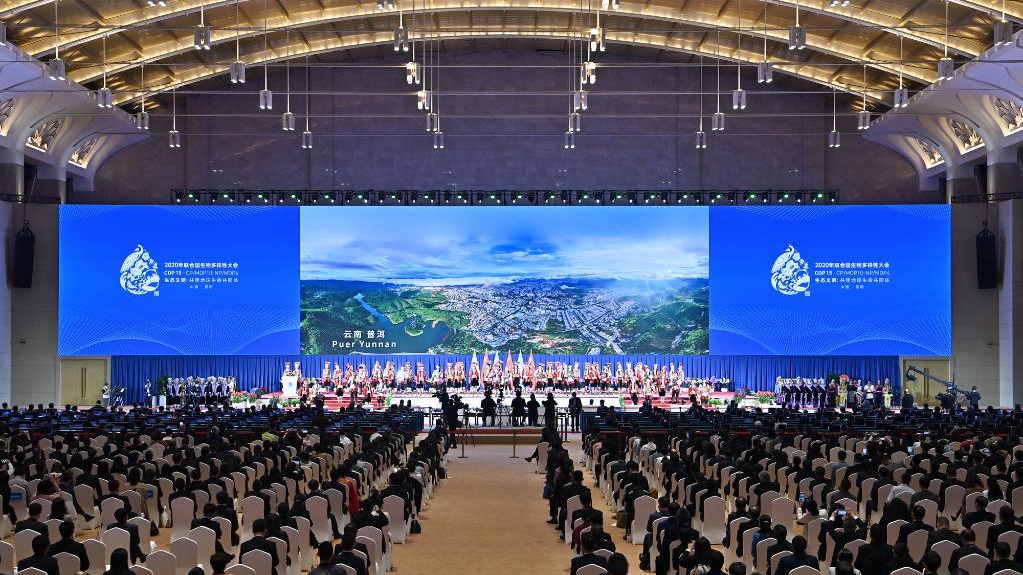
Editor's note: Decision Makers is a global platform for decision makers to share their insights on events shaping today's world. Marco Lambertini is director general of WWF International. The article reflects the author's opinions and not necessarily the views of CGTN.
Climate change has grabbed the world's attention over the past decade. And rightly so. The warming of our climate, driven by human-induced greenhouse gas emissions, is an enormous threat to us and other life on the planet.
COP26 – the UN climate talks taking place in Glasgow in November – represents a critical moment in our response to the climate crisis. More than 100 heads of state are expected to attend. And the world's media is already helping place a spotlight on the conference – and the efforts of citizens around the world to ensure their leaders take the necessary steps to secure a net zero emissions world by 2050.
But as we move toward crunch time for climate, it is essential that we do not overlook a second crisis human activities are driving in the natural world: a catastrophic loss in biodiversity.
Since 1970 – less than a lifetime – global wildlife populations have dropped by a shocking 68 percent on average.
These climate and nature crises are, of course, connected. The pressure we are placing on nature through the ways we feed, fuel and clothe ourselves is both driving greenhouse gas emissions and causing biodiversity to disappear at rates unprecedented in human history. In fact, some 70 percent of biodiversity loss on land is driven by unsustainable agriculture; and things are not very different in the ocean, where 90 percent of commercial fish stocks are either overfished or fully fished.
Wildfires, flooding and extreme weather have opened eyes to the risks posed by a warming climate. The threats presented by biodiversity loss are perhaps more subtle, but just as great. The collapse of the natural ecosystems that support us puts at risk our food and water security, as well as our economies.
Our destruction of nature is also increasing the risk of future pandemics. If we keep pulling apart the web of life on which all human beings depend, then sooner or later, it will collapse – taking humanity with it. Nature can no longer be viewed as a "nice to have" or simply a moral duty. It is the foundation of our economy and our well-being. And we are undermining it.
Nature is also on the frontline of the climate crisis. We are already seeing animals in their billions succumbing to forest fires and trees struggling to adapt to a changing climate, affecting their ability to act as carbon sinks, sucking carbon dioxide out of the atmosphere.
This is why it is essential that leaders do not miss the momentous opportunity over the next few months to take action which tackles both nature loss and the climate crisis at the same time.
While attention may be focused on COP26, the COP15, the UN biodiversity talks which have taken place this week and will conclude in Kunming in May next year, are just as important. They represent the "moment of truth" for nature: a once-in-a-decade opportunity to secure a global biodiversity agreement that is as ambitious and comprehensive as the Paris Agreement on climate change.

The opening ceremony of the 15th meeting of the Conference of the Parties to the United Nations Convention on Biological Diversity (COP15) in Kunming, southwest China's Yunnan Province, October 11, 2021. /Xinhua
The opening ceremony of the 15th meeting of the Conference of the Parties to the United Nations Convention on Biological Diversity (COP15) in Kunming, southwest China's Yunnan Province, October 11, 2021. /Xinhua
The week's talks – the official opening of COP15 – have seen important progress and seen China step into the role of COP president. With more than 100 governments committing to secure an ambitious biodiversity agreement that puts nature on the path to recovery by 2030 at the latest, it has sent a clear signal of political will which builds on the Leaders' Pledge for Nature made by 92 world leaders over the past year.
However, what's currently lacking is a robust plan to get there. The current draft of the biodiversity agreement falls short of delivering this aspiration in key areas, including by failing to include clear targets to repurpose all harmful public and private incentives and align public and private financial flows with nature-friendly practices in key economic sectors responsible for nature loss.
Top of the list, agriculture, fishing, infrastructure, forestry and mining. We urgently need leaders to translate commitments into ambition in the negotiation room.
Just like climate change, nature loss impacts everyone and can only be solved if we all pull together. It's therefore encouraging to see growing public awareness of the nature crisis, business voices calling for faster and stronger action, and an incredibly diverse and increasingly loud civil society voice calling for action.
So, what can we learn from the climate movement?
First, we need to do more to highlight the impacts of biodiversity loss on people and also the opportunities available through taking swift and decisive action. The COVID-19 pandemic has provided a wake-up call on our unbalanced relationship with nature that risks being ignored. While a recent ILO-WWF study found that 1.2 billion jobs depend on healthy natural systems, and another WWF report revealed that redirecting just one year's worth of harmful subsidies into nature-positive activities would create 39 million jobs.
Second, biodiversity loss does not have a clear and measurable global goal similar to climate's "net zero emissions by 2050" goal. We urgently need one to set the direction of travel. WWF is one of many organizations urging leaders to adopt a global goal of "nature-positive by 2030" – meaning we end the decade with more nature than we have today, not less.
And most importantly, we must recognize we should no longer treat climate change, biodiversity loss and economic development as separate issues. To be successful in our response to our connected environmental challenges, we must take integrated action.
COP26 and COP15 are both pivotal to delivering a sustainable future for people and the planet – success at both is fundamental to securing the eco-civilization that President Xi envisages and ensuring a future where we live in harmony with nature.
(If you want to contribute and have specific expertise, please contact us at opinions@cgtn.com.)

